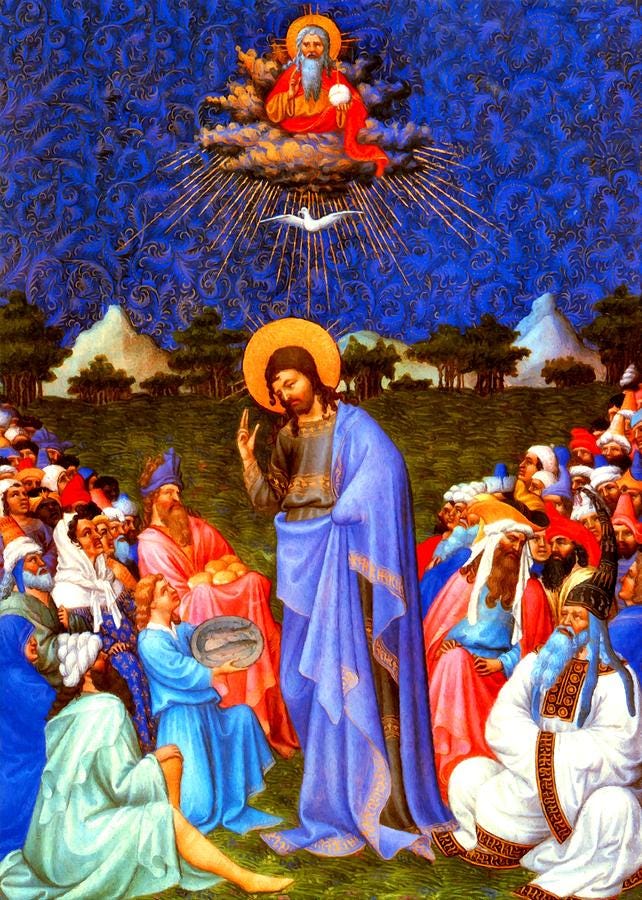Happy Easter, everyone! 💓
Amidst this most auspicious celebration of Jesus’s triumph over Death, I would like to share with you a theory.
The theory is this:
Jesus Christ wasn’t inviting people to join him in Heaven after dying.
He was actually teaching people how to achieve immortality — so that they never die in the first place.
Before we get into why I think this, let’s get on the same page about Immortality.
I introduced the topic of Immortality in my post Questioning Death.
In that post, I asserted that to become Immortal, one must first conceive of the possibility of Immortality. This entails relinquishing one’s resistance to Life (which manifests as the impulse to call Immortality evil, stupid, wrong, elitist, etc.)
Life is our default setting.
Since writing that post, I’ve dived more deeply on the topic — not only through personal practices, but also by reading materials written by people who have awakened the Immortal current within themselves, and/or lived in the presence of Immortals.
And I notice that all Immortalists say these key things:
The body must be treated as a temple of the Holy Spirit — with the utmost reverence and respect! God dwells in your body, so act like it!
Parasites and Rot must be removed from the Temple that is your body. This can be done through fasting and enemas (and if you’re really in your power, by mere authoritative command). Parasite Consciousness is the blueprint of Death, and thus, is incompatible with Life.
We do not “need” food, we do not “need” water, we do not “need” to sleep. This is because Humans are bioelectric divine Sovereign beings — and as such, we can self-sustain Life and regenerate indefinitely, like the Sun.
“Ineedto take life from others to sustain my own life”is a parasitic belief (hence the removal of parasites being necessary to Immortality)Once the “need” for “outside” sources of Life is removed, the Immortal is able to generate Lifeforce from within the body.
This self-generated spiritual sustenance has been called Amrita (the nectar of Immortality), Ambrosia (food of the Gods), Manna (bread from Heaven), and other things across spiritual traditions. It’s sometimes described as a sweet liquid that descends from the higher chakras down into the mouth, satisfying all hunger and thirst.
The proclamations of Immortalists are identical across cultures and creeds.
This is bigger than religion.
This is Truth.
So!
Christians, right?
They generally believe that, as a reward for believing Jesus Christ is their Savior, they’ll be allowed into Heaven in the “afterlife.”
Here lies our first challenge:
When did Jesus say that his believers will get to live forever after dying?
…
He didn’t.
In fact, He said the opposite:
John 10:27-28 KJV
27 My sheep hear my voice, and I know them, and they follow me:
28 And I give unto them eternal life; and they shall never perish, neither shall any man pluck them out of my hand.
“Never perish” means “never die,” my dude. 👀
He repeats this sentiment again in a later verse:
John 11:25-26 KJV
Jesus said unto her, I am the resurrection, and the life: he that believeth in me, though he were dead, yet shall he live: and whosoever liveth and believeth in me shall never die. Believest thou this?
The use of the word “believe” is interesting, because it challenges the widely-accepted notion that “believing in Jesus” means believing he’s the Savior.
What if “believing in Jesus” just meant “believing in what he’s saying about never-dying?”
Not many people believe that everlasting Life (without dying) is even possible.
Hence,
Matthew 7:13-14 NIV
Enter by the narrow gate; for wide is the gate and broad is the way that leads to destruction, and there are many who go in by it. Because narrow is the gate and difficult is the way which leads to Life, and there are few who find it.
Now let’s take a look at this hint that Jesus may have been eating Amrita/Manna/self-generated spiritual food:
John 4 31-32 NIV
Meanwhile his disciples urged him, “Rabbi, eat something.”
But he said to them, “I have food to eat that you know nothing about.”
The disciples went onto speculate about whether he’d eaten previously, suggesting that they couldn’t see the food Jesus was talking about.
Invisible food, eh?
Sounds like Amrita to me!
He also says:
Matthew 4:1-11
At that time Jesus was led by the Spirit into the desert to be tempted by the devil. He fasted for forty days and forty nights and afterwards was hungry.
The tempter approached and said to him, “If you are the Son of God, command that these stones become loaves of bread.”
He said in reply, “It is written: One does not live on bread alone, but on every word that comes forth from the mouth of God.”
An Immortalist would say that God’s power satisifes better than earthly food does.
So that tracks.
And let’s not forget Jesus’s repeated promise to nourish his believers with metaphysical food:
John 6:3-5
Jesus said unto them, “I am the bread of Life: he that cometh to me shall not hunger, and he that believeth on me shall never thirst.”
John 6:27
“Do not work for food that spoils, but for food that endures to eternal Life, which the Son of Man will give you. For on him God the Father has placed his seal of approval.”

There’s also the matter of The Essene Gospel of Peace.
If you’re not familiar with the “Jesus was an Essene monk” theory, I highly recommend this Bill Donahue lecture:
^ Bill makes his compelling case that Jesus was an Essene using Biblical evidence.
This paves the way for the extra-Biblical part of my “Jesus was an Immortalist” theory:
Knowing that the Bible was edited and translated multiple times, it's within the realm of possibility that key aspects of Jesus's teachings got “lost” along the way.
Enter the Essene Gospel of Peace.
A controversial book, to say the least. It was allegedly discovered in the highly secretive Vatican library.
The reason I consider it legitimate, is because its contents align with the tenets of Immortalism outlined above. Where there's consistency, there's something worth investigating.
For example, in this lost gospel, Jesus explains that the cause of many ailments — indeed, of death itself — is the existence of rot and parasites in the bowels.
He then provides instructions for how to perform a water enema in combination with fasting. This, he says, casts out parasites and allows the body to regenerate and heal from all pain and disease.
Which is exactly what Immortalists say.
I'll wrap up there, because just a re-minder: I don't claim to know the absolute Truth of who Jesus was. I merely wish to introduce a new way of looking at his message.
To anyone who might be thinking that I'm being blasphemous, consider the fact that I'm literally just quoting Jesus. Not adding or subtracting from his words.
A lot of what passes as “Jesus's teachings” in the Church, are distortions and hearsay that result from not actually reading his literal words.
Thus, Christians who believe that everlasting life is experienced in some afterlife-Heaven clearly missed the part where Jesus said Heaven is among us.
Here and now.









Thank you! Would you say this could be the ultimate red pill? (if such a thing exists)
P.S. As I finished reading your last line, I immediately sang "living on a prayer!"
Dolores Cannon wrote two books about Jesus the Essene !!!!! A must read for everyone !!!